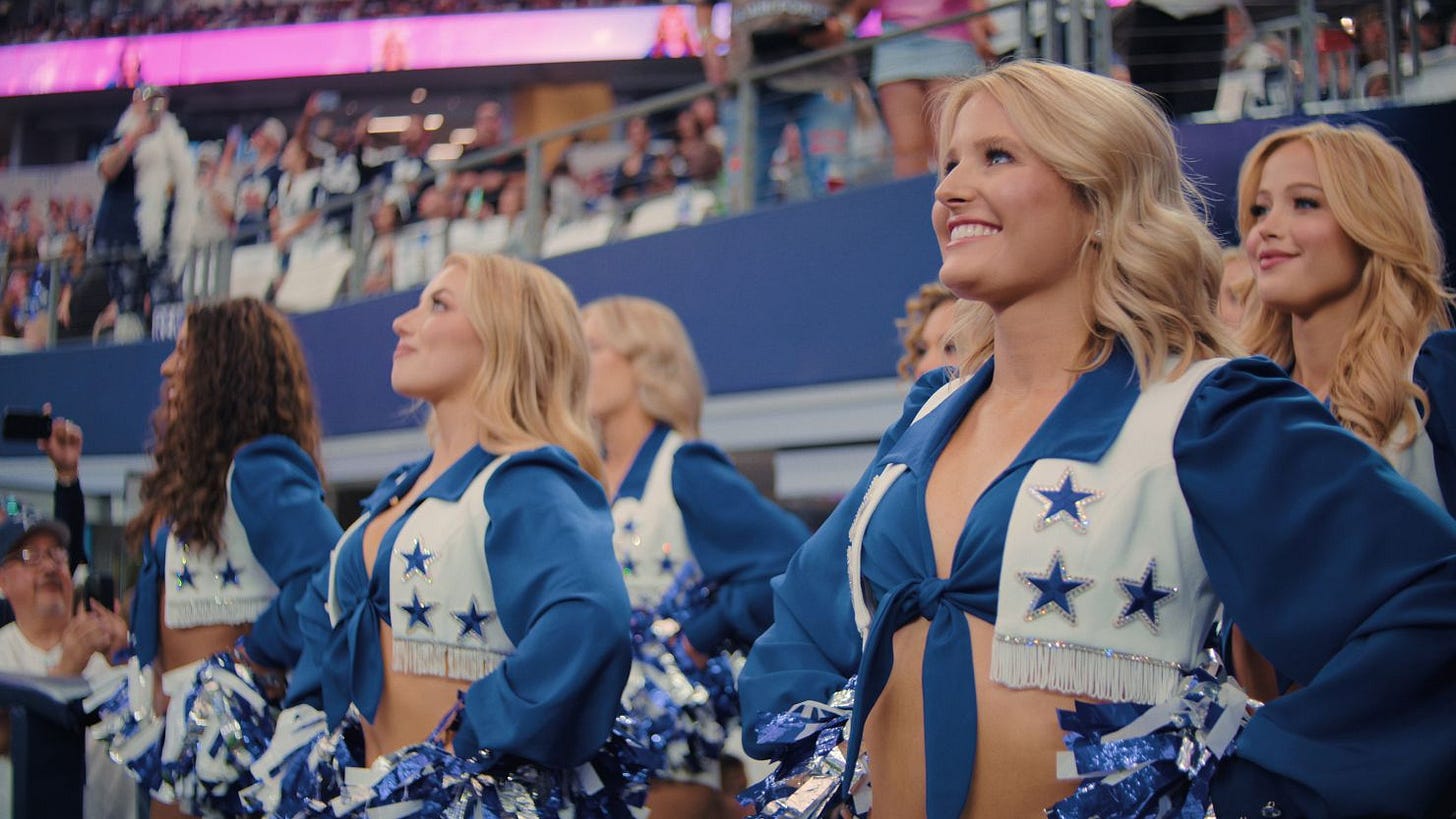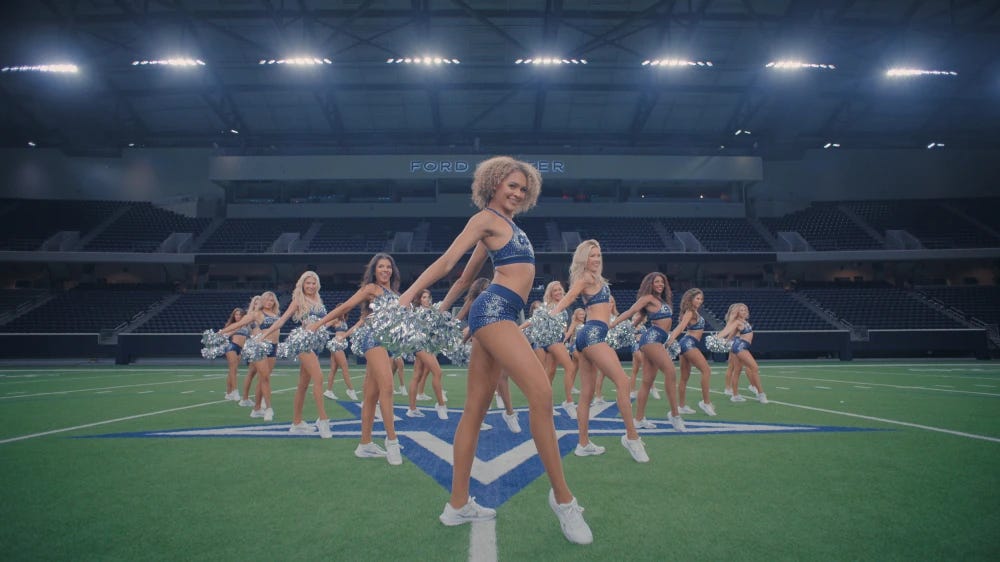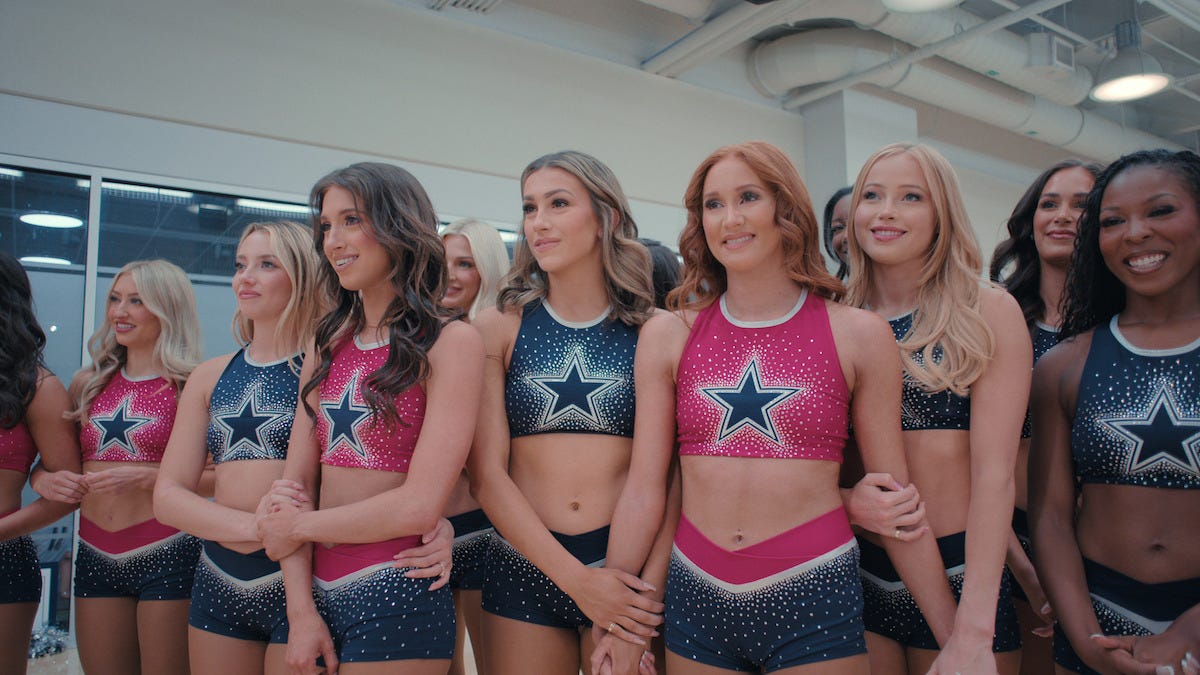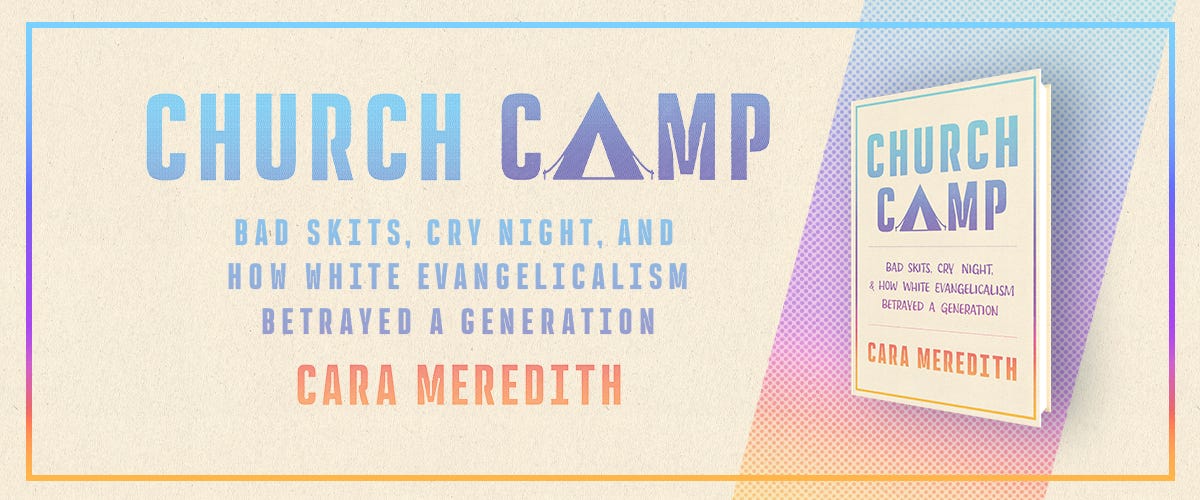DCC, white evangelicalism, and a little thing called pay equity
The argument centers on intangible pay and justifiable poverty, in the name of something bigger than yourself.
It happened again this last week, as it usually does: When I found out Netflix had released the second season of America’s Sweethearts: Dallas Cowboy Cheerleaders, I binge-watched all seven episodes in approximately 15 hours.

I don’t tend to watch a whole lot of television,1 but when I do I do it well. I go hard. I cram as much television as I can into the smallest window possible — and it haunts me in return (until I forget and eventually repeat the cycle all over again). In this case, I stayed up way too late and took in four episodes on Wednesday night, only to be met with a headache and a holiday the next morning, which allowed me to watch the remaining three episodes before Juneteenth festivities began later that day.
I have no regrets, even if I haven’t watched anything on the old boob tube since then and probably won't for another week or two at best.
After all, it’s cheerleading. It’s dance. It’s football. It’s this funky little microcosm of American culture that feels so far from my regular, ordinary life. I do not speak the language of hair extensions and curling irons, fake eyelashes and weekly manicures, chicken tacos (and no vegetables!) for dinner every night and high kicks that require a flexibility made real only in my dreams, but I sure love pretending like I speak it, if only for a short moment in time.
After all, the perky and beautiful young women on the show are not so much competing with each other2 as much as they are competing with themselves.
Queen of culture
concluded the same last year: “They are competing to embody a very specific, deeply Evangelical, and highly negotiated feminine ideal. They’re competing with each other to make the team, but that tension is secondary. They’re actually competing with themselves.”
While there’s enough to unpack in those three sentences alone, especially when it comes to evangelical subculture (and, if we’re honest, white evangelical subculture in particular). Even though I read Anne’s post3 after consuming all seven episodes, I watched it with this in mind — having been tipped off by another friend equally obsessed with the ties between evangelicalism and the DCC.4
There are so many rabbit trails we could go down, but I want to focus on one that was a major point of America’s Sweethearts this last season that also happens to find a home in various facets of white evangelicalism. And the rabbit trail goes to …pay equity.
Past episodes have stated that Dallas Cowboy Cheerleaders get paid $15 an hour and $500 for every appearance, based on experience;5 this is decidedly “more than any other professional cheerleaders, but the work is only for part of the year, and is paid by the hour.”6 According to Cosmopolitan, following last season’s show, (cheerleader) “Kat revealed that the DCC paid her the same amount as a full-time Chick-fil-A worker (around $37,947).”7
Given the fact that many of the women uproot their lives to move to the greater Dallas area, even though the swag bags alone are enough to make me want to cozy up with a curling iron and a couple sets of fake eyelashes too, nearly every woman on the show had to hold down multiple jobs, just to make ends meet.
According to Kelli Finglass and Judy Trammell, the director and head choreographer respectively, the fact that the women have outside careers is simply part of the culture, part of what made the DCC unique and different from everybody else. It’s what makes them even more special!
But as brand representatives, who put professional cheerleading and the Dallas Cowboys football and Netflix and a particular way of life on the board, one could also argue that the “set apart” argument is merely an excuse for not paying the women what they should have been paid in the first place.

So, DCC revolted — in a good, Christian girl sort of way. They put their needs out there. They spoke up. They asked for a raise. Even though pay equity became a major focus of episode 4, the viewer never saw what happened behind the scenes. We never found out if part of the fallout of losing 12 veterans the prior season perhaps had more to do with low wages than we’d been led to believe, it wasn’t until the very end of episode 7 that producers circled back to the problem.
DCC would get a 400 percent pay increase! Of course, even this number is also up for debate; Cosmopolitan reports that such a raise “would be somewhere around $151,000,” but because many of the opportunities are optional and schedule-based, not every cheerleader actually brings in such an amount.
Had they not fought for a pay increase, I don’t doubt the brand would have continued to spout an argument that also tends to cozy itself in the walls of white evangelicalism. It’s an argument that centers on relationship and on being part of something bigger than yourself — and it’s an argument that is made justifiable because lives are being changed.
Take the words of Dallas Cowboys co-owner and chief brand officer Charlotte Jones:
“There’s a lot of cynicism around pay for NFL cheerleaders, and as it should be — they’re not paid a lot. But the facts are they actually don’t come here for the money. They come here for something that’s actually bigger than that to them. They have a passion for dance. There are not a lot of opportunities in the field of dance to get to perform at an elite level. It is about being a part of something bigger than themselves. It is about a sisterhood that they were able to form, about relationships that they have for the rest of their life. They have a chance to feel like they are valued, that they are special and that they are making a difference. When the women come here, they find their passion and they find their purpose.”
The argument centers on a pay that is intangible — that is worth more than silver, that brings in more profit than gold, that is more precious than rubies.8 If you’re familiar with the Bible, then you know that the proverbial argument for wisdom becomes the argument used by church camps and vacation bible schools and youth groups alike.

And it’s the argument that effectively justifies poverty, often in the name of the Lord.
I write the following of seasonal staff workers in Church Camp:
For those of us who ventured to dip our college-aged toes in the waters of church camp, we didn’t set out to get rich while teaching small children about Jesus and munching on a steady diet of hotdogs and hamburgers—but we also didn’t sign up to exhaust ourselves with fifteen-hour workdays and salaries more than 60 percent below the poverty line. As one church camp boasts in its summer staff application, “This is extremely tough work, involving long days and sometimes menial tasks, but it is also extremely rewarding! The eternal impact you will have on the lives of campers, as well as the life-long friendships you will form with fellow staff members makes it all worth it!” Even if the cost of room and board is worth an additional 40 percent, one has to wonder if an average $246 a week paycheck is worth the cost of tough work, long days, and menial tasks—especially if the sum is understood in terms of weekly and hourly rates.9
According to my calculations, even if summer staff get 24 hours off every weekend, they’re also working an 83-hour week, making $2.96 an hour, or $41 a day, based on a six-day work week. (Cabin leaders, or counselors, it could be argued, actually work closer to 137 hours a week and make approximately $1.80 an hour).10
But is it okay if a seasonal staff employee knows what they’re getting into, if they understand that low pay results in high impact in a variety of different ways? If the good somehow outweighs the bad and the memories they’ll hold onto forever are worth more than a few pennies kicked over to an already-low checking account?
It’s not too hard to see how the argument is one and the same.
While I purposefully don’t provide a solution to the problem of pay equity for seasonal summer staff employees, I still raise my voice and speak up.
What this might mean for ropes course instructors, lifeguards, and camp counselors (among other evangelical employees), that I do not know.
In DCC I trust?
C.
Generally, I’d rather read a book, so I read a lot of books. But also, I seem to have a rather high sensitivity to screens, as evidenced by the sentences in the remainder of the paragraph. I know that if I watch something after 9 pm, it’ll kick my mind into overdrive and I’ll have a hard time sleeping that night. So, I tend to read books instead.
Interestingly enough, the girls repeatedly remind one another of this fact, in every episode it seems.
Although I would normally instead say “Petersen” to refer to an author, I consider Anne a (new) friend of mine. In that way, I call her by her first name instead of her last. To me, this is the only exception.
I’m looking at you,
Proverbs 3:14-15
Church Camp, page 159
Church Camp, page 160




The number of below-the-poverty-line jobs evangelical woman are voluntold to take are insane. For me, it’s every job I’ve ever had.
What a theological twist and kick! The DCC wage justifications echo the same dusty hymn I heard while scraping mashed potatoes off a camp kitchen wall for $1.80/hour: “It’s not about money, it’s about ministry!” Ah yes—just like Jesus said: blessed are the underpaid, for they shall inherit… lifelong friendships and shin splints. The dance may be elite, but the exploitation is downright old school evangelical. Sisterhood is beautiful, but it shouldn’t come at the cost of economic dignity. Give them their wages and their glitter.